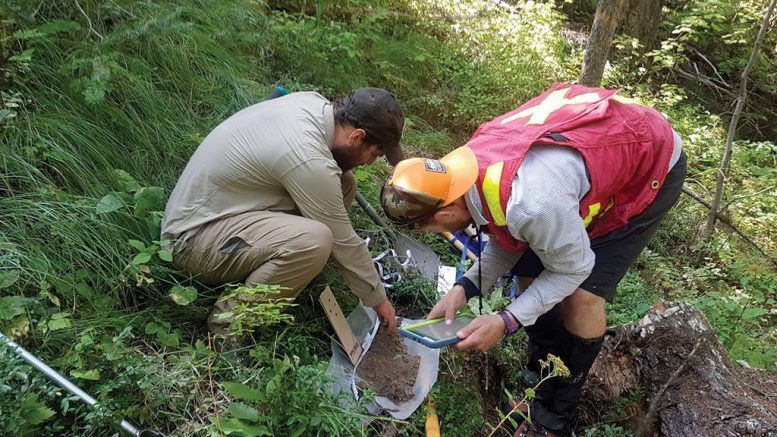The latest drill results from Talisker Resources’ (TSX: TSK) past-producing Bralorne gold project in south-central B.C. hit new mineralization below historic workings and southeast of prior intercepts. With a resource estimate expected in 2022, Talisker plans to incorporate these assays into its dataset and is completing a 50,000-metre drill program this year.
Most recent drillhole assays are from the King, Bralorne East and Bralorne West blocks within a 6-km long strike of gold-bearing veins.
The bottom half of first hole drilled by Talisker at the King block returned 0.9 metres of 9.95 grams gold per tonne starting at 827.9 metres. This intercept hit gold 750 metres beyond the historic King workings.
At Bralorne East, an initial hole completed east of the Empire fault stepped out high-grade gold to the southeast, returning 0.5 metres of 13.9 grams gold per tonne from 514.8 metres and 0.5 metres of 12.85 grams gold per tonne starting at 120.4 metres.
Drilling at Bralorne West confirmed the structural strike continuity within this block; notable intercepts included 0.7 metres of 10.3 grams gold from 537.8 metres; 1 metre of 15.1 grams gold starting at 380.7 metres; and 0.6 metres of 16.55 grams gold from 407.1 metres.

Examining core aat Talisker Resources’ Bralorne gold project in B.C. Credit: Talisker Resources
“Together with the consistency of the received gold grades, these results show significant down plunge extensions of the high-grade vein potential, particularly below the historic King Mine which was only mined to 350m from surface,” Terry Harbort, Talisker’s president and CEO, said in a news release. “With each stepout hole we are seeing the dimensions of the system increasing from our initial view and we plan to increase our drill program to accommodate the new target areas.”
Four rigs are working at the site with 18,111 metres of the 50,000-metre program drilled to date.
With 30 gold-bearing veins defined at Bralorne, Talisker is targeting both high-grade material that was the main source of historic gold production from the site as well as previously overlooked near-surface bulk tonnage mineralization.
The initial resource would focus on 14 veins and extend down to a depth of 700 meters.
Three historic mines within the Bralorne complex, 248 km northeast of Vancouver, produced 4.2 million gold oz. from an average recovered grade of 17.7 grams gold before closing in 1971.
Talisker holds over 2,783.6 sq. km of mineral claims in southern B.C.
At the end of March, producer New Gold (TSX: NGD) announced that it was acquiring a 14.9% interest in Talisker.


Be the first to comment on "Talisker steps out Bralorne gold system in BC"